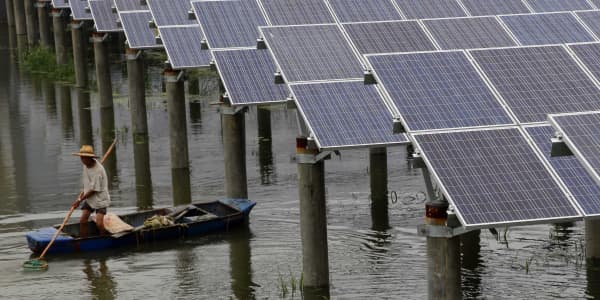With Taiwan's pro-independence party tipped to win next year's presidential election, some analysts fear that could renew tensions in cross-strait relations and risk destabilizing Asia.
"It is time to start worrying about Taiwan ... Old questions about Taiwan's longer-term future are re-emerging, and so are old fears that differences over Taiwan could rupture U.S.-China relations and drive Asia to a major crisis," said Hugh White, professor of strategic studies at the Australian National University.
Despite splitting ways amid a civil war in 1949, China continues to regard Taiwan as part of its territory and has never ruled out the use of force as an option to reunify the island of 23 million. Under the stewardship of Taiwan's President Ma Ying-jeou, cross-strait ties have been on the mend and in recent years the two countries have developed closer economic dealings.
However, analysts feel a renewed chill in relations cross-strait ties is on the cards, after the ruling Kuomintang (KMT) party in Taiwan suffered a defeat in December's local elections, which were widely seen as a prelude to the 2016 presidential polls.
Read MoreChina says no to Taiwan on AIIB: What it means
Ma's China-friendly stance was named the key culprit, as most Taiwanese remain wary of cosying up with the mainland. As a result, political watchers expect Tsai Ing-wen, chairwoman of the anti-China Democratic Progressive Party (DPP), to win the vote come January's election.
China remains highly suspicious of the DPP, especially after former DPP leader Chen Shui-bian stepped on Beijing's toes by advocating the island's independence during his 2000-2008 term. Another opposition representative in office naturally alarms Beijing, according to White.
"While few expect that any future leader will return to policies as provocative as Chen, the new leader will almost certainly be more assertive than Ma. Hence, there is a risk that Beijing will respond by taking a tougher line [and] look for new ways to pressure Taipei," he wrote in a commentary published in The Straits Times in April.
Ian Bremmer, president and founder of Eurasia Group, agrees. "If China decides that its strategy of economic engagement with Taiwan has failed, Beijing might well backtrack on existing deals and significantly harden its rhetoric," said Bremmer, who named Taiwan as a potential market-moving risk in an article titled 'The top 10 geopolitical risks of 2015'.
And there are already signs of growing impatience from Beijing, according to White and Bremmer, which appears set to be a risk for the rest of the region, as well as Washington. While the U.S. backs a 'one-China policy', it is Taiwan's main ally and has committed to supporting the island in the event of a renewed conflict.
"U.S. leaders still talk boldly about their willingness to stand by Taiwan without seriously considering what that means in practice. Any U.S. effort to support Taiwan militarily against China would be almost certain to escalate into a full-scale U.S.-China war and quite possibly a nuclear exchange," White wrote.
Read MoreWhile HK mulls limits, Taiwan welcomes China tourists
Risk-on? Maybe not
To be sure, not all analysts feel that a return to power by Taiwan's opposition will spark a sharp deterioration in ties with the mainland.
For one, DPP's presidential hopeful Tsai has reiterated a principle of "maintaining the status quo" — no mutual recognition and no unilateral change of status — if elected. Experts attribute the 58-year-old party chairwoman's moderate stance to her time in office as the Mainland Affairs Council Minister under the previous DPP administration.
"Tsai has been making the right noises. She has learnt the lessons from Chen Shui-bian so she would try to preserve economic relations while ensuring that Taiwan isn't falling under the orbit of China," Hoo Tiang Boon, assistant professor with the China programme at the S. Rajaratnam School of International Studies (RSIS), Nanyang Technological University, told CNBC.
"People like to associate DPP with Chen's DPP, but they've changed," he added.
Beijing is also unlikely to alienate the DPP and backtrack on existing economic arrangements as that will only undermine Beijing's position in Taiwan, according to David Yang, principal analyst for china, country risks and economic forecasting, at IHS.
"Over the past eight years, Beijing has gained more experience at dealing with the DPP and has come to accept that the DPP will remain a major political force that cannot be marginalized. With experience, they have also come to realize that the DPP is not a monolithic block without its own internal disagreements. Beijing will attempt to seek out partners within the DPP that it can do business with," Yang wrote in an email to CNBC.
Read MoreKaty Perry lights up cross-straits political fireworks
On the question of how the U.S. could respond if China tries to compel reunification, NTU's Hoo thinks military support from the West would be unlikely.
"If China instigates military actions, the U.S. will be obliged to respond, but there is leeway for the U.S. because it doesn't state how Washington must respond," said Hoo. Even though the U.S. has a strong interest in preserving Taiwan's democracy, Washington has an equally significant interest in preserving the peace and stability of the Taiwan Strait, he added.
As such, Taiwan is unlikely to precipitate a crisis that can rock the region's boat and remains less worrisome than other hotspots such as the South China Sea and rogue state North Korea.
"The risk of cross-strait conflicts will certainly increase in the event of a DPP victory. However, I think both sides will exercise restraint since a conflict will be economically damaging to both sides," IHS's Yang said.
"Instead of talking about the extremely remote possibility of a U.S.-China nuclear exchange, I think we ought to be worried about the 20 or so bombs in the North Korea stockpile and the very mercurial leadership controlling it."




